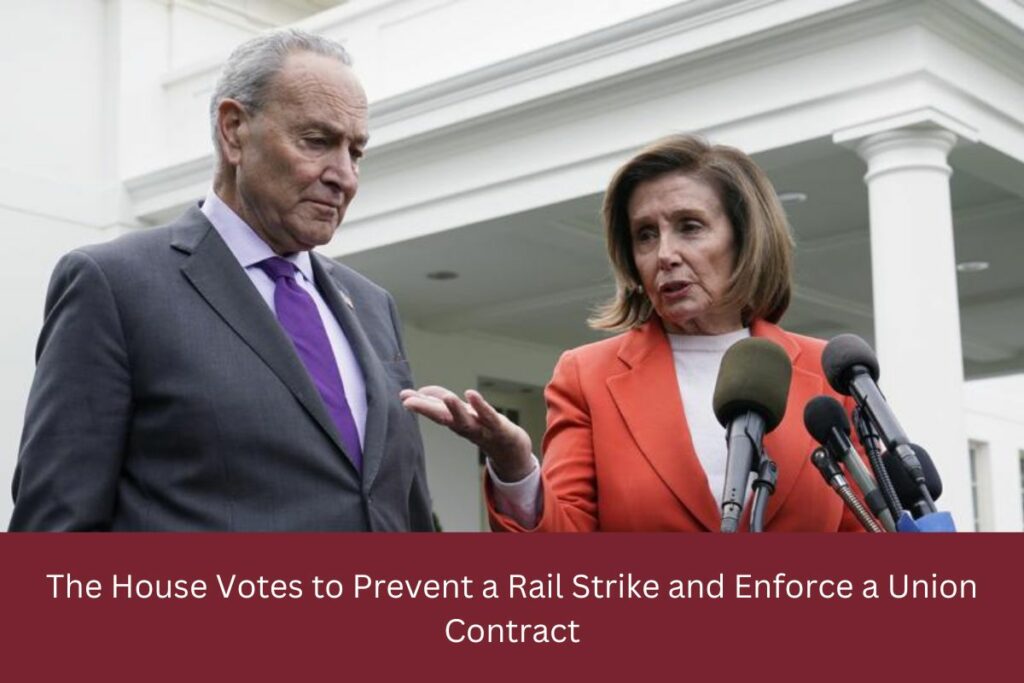A law that would obligate businesses and employees to a proposed settlement that was agreed upon in September but rejected by some of the 12 unions involved was passed by the U.S. House on Wednesday in an effort to prevent the impending statewide rail strike.
The bill was approved 290-137, and it will now go to the Senate. President Joe Biden will sign it if it is approved there; he urged the Senate to move quickly. “Railroads will start to prohibit the movement of crucial supplies like chemicals to purify our drinking water as soon as this weekend,” Biden stated, “without the certainty of a final vote to avoid a shutdown this week.
” I’ll repeat it: If we don’t take action this week, there will be disruptions to our food distribution, gasoline refinery waste removal, and auto supply chains. Organizations in business, including the U.S. The Chamber of Commerce and the American Farm Bureau Federation have cautioned that the economy would suffer a catastrophic $2 billion per day hit if rail service were to be stopped.
You May Be Interested In:
- After Being Re-elected, What Will Newsom Do?
- Mastriano, a Trump Supporter, Has Conceded the Governorship of Pennsylvania
Four of the 12 unions representing around 115,000 workers at significant freight railways ultimately voted against the bill, which would have imposed a compromise labor agreement negotiated by the Biden administration. If a deal cannot be struck by a deadline of December 9, the unions have vowed to go on strike.
Both Democratic and Republican lawmakers expressed concerns about ignoring the negotiations. For Democratic senators who have always sought to associate themselves with the politically potent labor unions that attacked Biden’s move to intervene in the contract dispute and avoid a strike, the intervention was particularly challenging.
In response, House Speaker Nancy Pelosi added a second vote on Wednesday that would provide insured rail workers an additional seven days of paid sick leave per year. But it won’t go into effect unless both bills are approved by the Senate.
Since Republicans strongly rejected the sick leave provision, the House passed it too, but by a considerably smaller majority of 221-207, signaling that the chances of the add-on being approved in the evenly divided Senate are remote.
Business organizations and the trade group Association of American Railroads applauded the House’s decision to stop the walkout but urged senators to oppose including sick time in the agreement. “Any effort to place Congress’ thumb on the bargaining scale to artificially favor either party or otherwise hinder a speedy conclusion, would be completely irresponsible,” said Ian Jefferies, head of the AAR. “Unless Congress wants to become the de facto endpoint for future negotiations.”
However, the Transportation Trades Department labor alliance, which represents all rail unions, applauded the decision to extend sick leave and criticized politicians who opposed it for having “abandoned their working-class voters.”
Now attention shifts to the Senate, where it’s uncertain when a vote will take place. Marty Walsh, the secretary of labor, and Pete Buttigieg, the secretary of transportation, will meet with Democratic senators on Thursday to go through the train negotiations. Democrats want the Senate to vote on mandating seven days of paid sick time.
Sen. Elizabeth Warren, a Democrat from Massachusetts, said: “A multibillion-dollar industry that is engaging in buybacks and that has doubled its profit margins throughout the pandemic should not be able to force its workers to come in when they are sick and injured.”
However, the majority of Republicans are hesitant to change the provisional accord established in September. Sen. John Thune, R-South Dakota, said, “I think it’s a horrible precedent for us to wade into the subtleties and specifics of matters like this that have been discussed for three years.”
Along with other quality-of-life issues, the demand for paid sick leave was a major sticking point in the negotiations. The railroads claim that during negotiations throughout the years, the unions decided to forego paid sick days in exchange for higher pay and generous short-term disability benefits.
Railroads might explore offering paid sick time in the future, according to Jefferies, but any reform should hold off until a fresh round of negotiations. The unions contend that since railroads are already making record profits, they can easily afford to add paid sick days. Several of the major railways engaged in these contract negotiations recorded third-quarter profits of more than $1 billion.

